喷墨打印机盒盖注塑模具设计
无需注册登录,支付后按照提示操作即可获取该资料.
喷墨打印机盒盖注塑模具设计(开题报告,中期报告,外文翻译,论文说明书19000字,CAD图10张)
摘要
本设计为打印机盒盖注塑模的设计。设计中采用一模一腔,浇口采用点胶口,分型面选在截面最大处,塑件成型后利用推杆将成型制品从动模上推出,回程时利用复位杆复位。
设计中需要对塑件的尺寸进行计算,确定尺寸精度,然后进行注射机的初步选取。以及对注塑机的浇注系统、成型零件的结构、成型零件的尺寸、脱模推出机构、排气系统、温度调节系统进行了设计与计算。并且对注射机参数进行校核,包括模具闭合厚度、模具安装尺寸、模具开模行程、注射机的锁模力等。各个参数都满足要求后才能确定注射机的型号。
在设计过程中,为了更清楚的表达模具的内部结构,因此附有动模镶块、定模镶块、定模推板的二维零件图和模具三维爆炸图。
关键词:打印机盒盖;分型面;浇口;工艺分析
Ink jet printer cover injection mold design
Abstract
This design is the design of injection mould for the cabinet. The design uses two mold cavity, type of the sprue is latent gate, the parting surface is chosen in the maximum section of the plastics. After plastics are molded, molding products are driven by putting from dynamic model,then using reset stem returned.
In the design ,The need to calculate the size design, determine the size precision, the preliminary selection and the injection machine. And the injection molding machine of gating system, forming part of the structure, forming part of the size, mold release mechanism, exhaust system, temperature control system design and calculation. And to check the injection machine parameters, including the thickness of mold closing, mold installation size, mold opening stroke, the clamping force injection molding machine etc.. All the parameters meet the requirements to determine the type of injection machine.
In the design process, in order to express more clearly the internal structure of the mold, so a moving die insert, fixed die insert, the fixed mould push plate 2D part drawing and 3D map explosion.
Keywords: Cabinet;Parting;surface;Runner;Process analysis
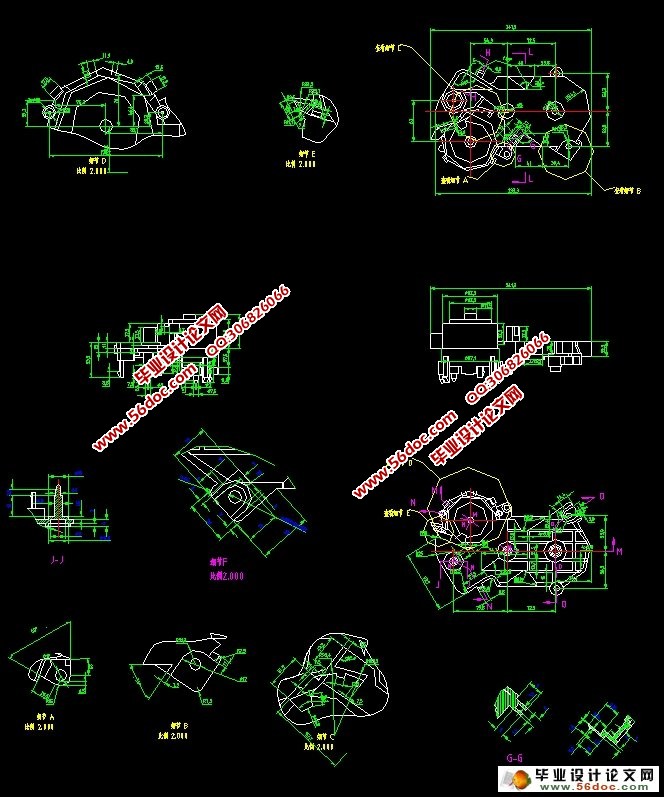
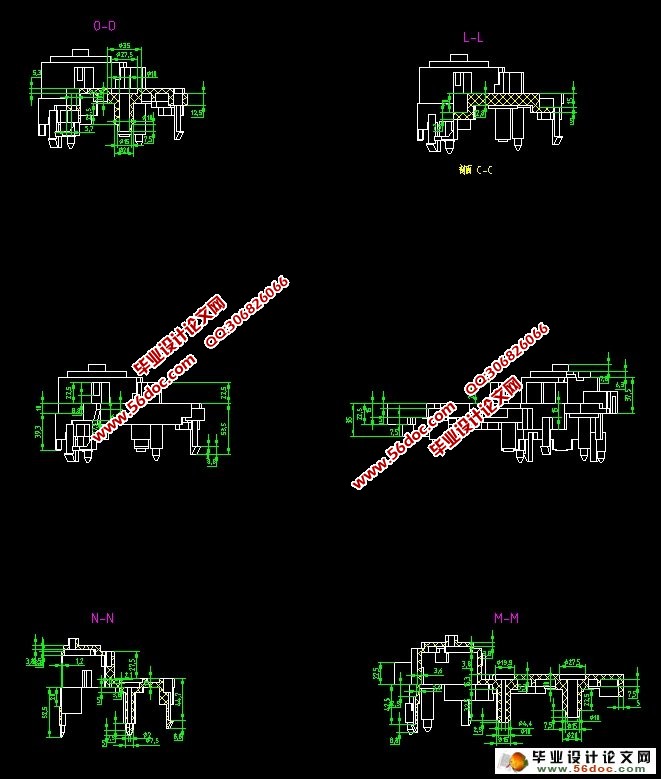
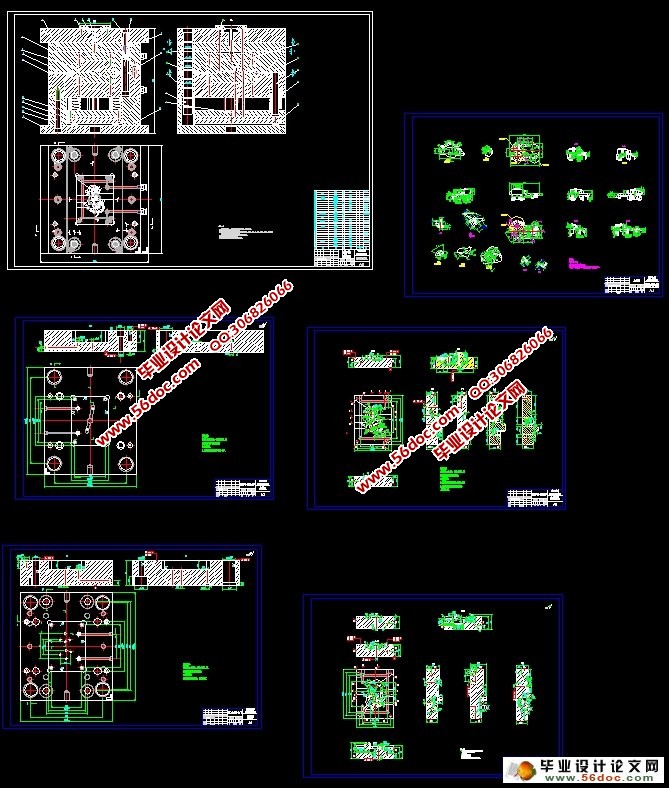
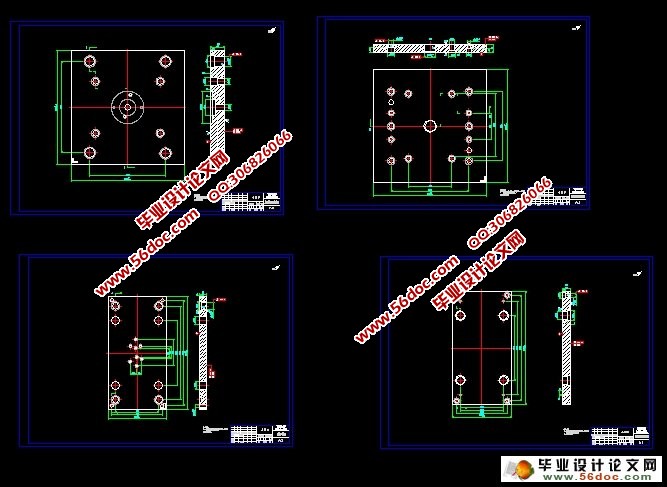
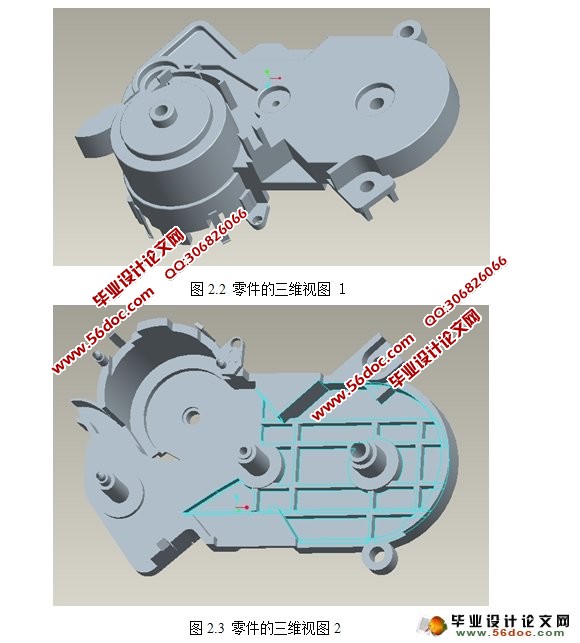
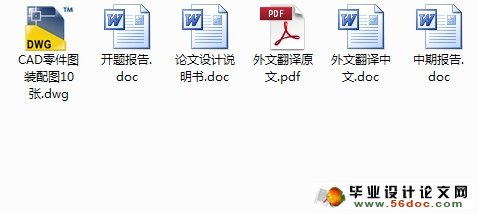
目 录
1 绪论……………………………………………………………………………1
1.1 题目背景………………………………………………………………………1
1.2 题目国内外相关研究情况……………………………………………………1
1.2.1 国内研究的情况…………………………………………………………1
1.2.2 国外研究情况……………………………………………………………2
1.3中国与国外先进技术的差距…………………………………………………2
1.4塑料模具发展走势……………………………………………………………2
2 产品分析……………………………………………………………………4
2.1 塑件分析……………………………………………………………………4
2.1.1结构分析…………………………………………………………………4
2.1.2尺寸精度分析……………………………………………………………5
2.1.3 塑件厚度检测……………………………………………………………5
2.1.4 表面质量分析……………………………………………………………5
2.2 塑件材料选择………………………………………………………………6
2.2.1 物理性能…………………………………………………………………6
2.2.2 ABS的主要性能指标…………………………………………………6
2.2.3 ABS成型塑件的主要缺陷及消除措施…………………………………6
3 拟定模具结构形式及注射机的初步选择………………………………7
3.1 分型面位置的确定…………………………………………………………7
3.1.1模具的分型面…………………………………………………………7
3.1.2 分型面的确定…………………………………………………………7
3.2 塑件相关计算……………………………………………………………8
3.2.1塑件相关计算…………………………………………………………9
3.3 型腔数量的确定…………………………………………………………10
3.4 初步选择注塑机…………………………………………………………11
4 浇注系统的设计……………………………………………………………13
4.1浇注系统 ……………………………………………………………………13
4.1.1浇注系统的作用………………………………………………………13
4.1.2 浇注系统布置…………………………………………………………13
4.2 浇注系统设计…………………………………………………………13
4.2.1 浇口套的设计…………………………………………………………13
4.2.2 浇注系统的设计………………………………………………………16
4.2.3 分流道与浇口…………………………………………………………17
4.3 浇口设计……………………………………………………………………18
4.3.1 浇口的类型………………………………………………………………18
4.3.2 浇口的位置 ……………………………………………………………18
5 成型零件的工作尺寸计算……………………………………………20
5.1 成型零件工作尺寸的计算………………………………………………20
6 成型零件结构设计…………………………………………………………24
6.1 PRO/E中的模具模块设计………………………………………………24
6.1.1 凹模结构设计……………………………………………………………25
6.1.2 凸模结构设计…………………………………………………………25
7导向机构设计………………………………………………………………27
7.1导向机构………………………………………………………………………27
7.1.1 导柱…………………………………………………………………27
7.1.2 导套………………………………………………………………………28
7.1.3 导柱与导套的配用………………………………………………………29
7.1.4 导柱布置…………………………………………………………………30
7.2 定位装置…………………………………………………………………30
7.2.1 拉杆………………………………………………………………………30
7.3 尼龙开闭器装置……………………………………………………………30
8 脱模推出机构的设计………………………………………………………32
8.1 在设计脱模推出机构是应遵循下列原则…………………………………32
8.2 脱模力的计算……………………………………………………………32
8.3 推出机构设计……………………………………………………………32
8.3.1 推杆布置…………………………………………………………………32
8.3.2推杆结构及固定………………………………………………………33
8.3.3 推杆强度交核……………………………………………………………33
8.4 拉料机构…………………………………………………………………34
9 排气系统设计……………………………………………………………36
10 温度调节系统设计………………………………………………………37
10.1 对温度调节系统的要求…………………………………………………37
10.2 冷却系统设计……………………………………………………………37
10.2.1 冷却回路的布置………………………………………………………37
10.2.1 设计原则………………………………………………………………37
10.2.2 冷却时间的确定…………………………………………………38
10.3 模具冷却系统的计算…………………………………………………39
11 注塑机的校核………………………………………………………………40
11.1 最大注塑量的校核………………………………………………………40
11.2 锁模力的校核 ……………………………………………………………40
11.3 喷嘴尺寸校核……………………………………………………………40
11.4 定位圈尺寸校核……………………………………………………………41
11.5 模具外形尺寸校核………………………………………………………41
11.6 模具厚度校核……………………………………………………………41
11.7 模具安装尺寸校核………………………………………………………41
11.8 开模行程的校核……………………………………………………………41
12 模具工作过程……………………………………………………………43
12.1 模具总体结构………………………………………………………………43
12.2 开合模动作…………………………………………………………………45
13 模具可行性分析…………………………………………………………46
13.1 本模具的特点……………………………………………………………46
13.2 市场效益及经济效益分析…………………………………………………46
结论……………………………………………………………………………… 47
致谢…………………………………………………………………………… 48
参考文献……………………………………………………………………… 49
